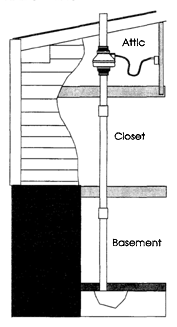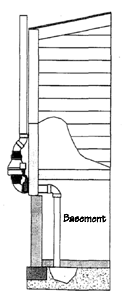

What is it?
Radon is an odorless, tasteless, colorless, radioactive gas. It is created by the natural decay of uranium, and is found throughout the world in the earth's crust.
Health Risk
Radon exposure increases the risk of contracting lung cancer. There are no symptoms. Radon is not like toxins, viruses or pollens. If you are experiencing headaches, nausea or some other symptom, it is from something other than radon.
Does My House Have Radon?
1. All homes have some level of radon. If the level of radon is above 4 pCi/L, pico Curi per Liter, the EPA recommends follow-up testing since the level of radon varies seasonally. Corrective action is advised if the annual average is above 4 pCi/L.
2. Testing is the only way to determine if a house has an unsafe Radon level.
3. The test for Radon takes 48 hours. Usually a passive device is used which will require several more days for the lab to receive and analyze the sample.
What If My Radon Level Tests Above the EPA's Level of 4.0 pCi/L?
1. Retesting is recommended to verify that the test was correct.
2. If the Radon is elevated, it can be reduced to below 4.0 pCi/L in all homes. In 95% of the homes the Radon is reduced with a sub-slab depressurization system; costs are around $1,500. The more difficult homes would cost more (e.g. crawl spaces, non-concreted floors, block foundations, etc.).
3. A home with a Radon reduction system is usually much safer than one without a system. This is because a properly installed system usually reduces the levels to below 2.0 and often below 1.0. So if you have a true concern for Radon, a home with a remediation system is preferred.
4. Radon reduction systems are fairly simple, consisting of a vent pipe and a blower fan. The fan runs continuously and usually consumes the same amount of electrical power as a 60 watt light bulb.
5. If you are lucky enough to have a Radon system, never turn the blower off for extended periods of time to conserve electric power. Often the blower motor will fail if left off. Replacement of the blower is several hundred dollars. For this amount of money, you could run the blower for years.
6. It is advised to test for Radon every fall if you have a system. The system should have a pressure gauge or an alarm to verify that the fan is still operating. A test will verify that everything in the system is running properly.
| Typical Indoor System
(with Radon blower located in vented attic) |
Typical Outdoor System
(with Radon blower located outside) |
|
 |
 |
| Radon Level | If 1,000 people who smoked were exposed to this level over a lifetime... | The risk of cancer from radon exposure compares to... | WHAT TO DO: |
| 20 pCi/L | About 135 people could get lung cancer | 100 times the risk of drowning | Fix your home |
| 10 pCi/L | About 71 people could get lung cancer | 100 times the risk of dying in a home fire | Fix your home |
| 8 pCi/L | About 57 people could get lung cancer | Fix your home | |
| 4 pCi/L | About 29 people could get lung cancer | 100 times the risk of dying in an airplane crash | Fix your home |
| 2 pCi/L | About 15 people could get lung cancer | 2 times the risk of dying in a car crash | Consider fixing between 2 and 4 pCi/L |
| 1.3 pCi/L | About 9 people could get lung cancer | (Average indoor radon level) | (Reducing radon levels below 2 pCi/L is difficult) |
| 0.4 pCi/L | About 3 people could get lung cancer | (Average indoor radon level) |
| Radon Level | If 1,000 people who never smoked were exposed to this level over a lifetime... | The risk of cancer from radon exposure compares to... | WHAT TO DO: |
| 20 pCi/L | About 8 people could get lung cancer | The risk of being killed in a violent crime | Fix your home |
| 10 pCi/L | About 4 people could get lung cancer | Fix your home | |
| 8 pCi/L | About 3 people could get lung cancer | 10 times the risk of dying in an airplane crash | Fix your home |
| 4 pCi/L | About 2 people could get lung cancer | The risk of drowning | Fix your home |
| 2 pCi/L | About 1 person could get lung cancer | 2 times the risk of dying in a home fire | Consider fixing between 2 and 4 pCi/L |
| 1.3 pCi/L | Less than 1 person could get lung cancer | (Average indoor radon level) | (Reducing radon levels below 2 pCi/L is difficult) |
| 0.4 pCi/L | Less than 1 person could get lung cancer | (Average indoor radon level) |